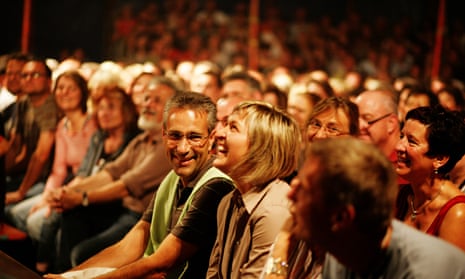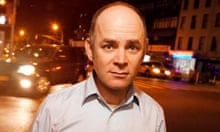It’s the world we live in: every human activity broken down into measurable chunks, everything made quantifiable, the easier to be priced, packaged and sold. So why should comedy be spared? But still, this story has the air of a belated (or early) April Fool. Is there really a theatre in Barcelona that’s set up a pay-per-laugh scheme for comedy audiences? Are standup punters really being charged every time they crack a smile?
The Guardian’s product and service reviews are independent and are in no way influenced by any advertiser or commercial initiative. We will earn a commission from the retailer if you buy something through an affiliate link. Learn more.
Apparently, they are. The Teatreneu club in Barcelona has introduced the system, in cahoots with ad agency The Cyranos McCann. It’s a response, reportedly, to a spike in Spanish government taxes on theatre tickets, which has scared audiences off live performance. This pay-per-laugh wheeze draws on facial recognition technology. A tablet is fitted to the back of each seat, which reads audience members’ facial expressions and runs up a tab of smirks, chuckles and belly laughs. Each laugh (the BBC tells us) is charged at €0.30 (24p), and once you’ve spent €24 (£19), you can knock yourself out – every subsequent laugh is free.
Now, I was once fingered as the real-life template for the anti-hero of Russell Kane’s novel The Humorist – a critic who is “incapable of laughing or smiling”. By that argument, surely I’d welcome an arrangement to secure me free comedy in perpetuity. Then there are those “high cultural capital” comedygoers – as per sociologist Sam Friedman’s research – who consider that “laughter contaminated the aesthetic experience” of comedy. Again, news of this scheme might prompt even these committed killjoys to break out a cheesy grin.
But even if I were stony-faced in the aisles, I wouldn’t want to spend half a comedy gig distracted by an image of that unsmiling mush on an iPad 12in from the end of my nose. And in fact, I like a laugh. Whether I’d like a laugh so much if I submitted to a system that monetised that laugh, making me highly conscious of every laugh I laughed, and every laugh I didn’t (to the detriment, you’d think, of much enjoying the act on stage) is less clear.
So how to take this? As a harmless gimmick that (hats off to The Cyranos McCann!) has garnered worldwide media attention? As a harbinger of the apocalypse? Taken seriously, it’s flatly reductive for comedy, with its implication that the most valuable comedy is the comedy that generates most laughs. Were pay-per-laugh to take off, would any club ever again book experimental comics – the ones who risk deferring laughter, or withholding it; the ones who generate not quantity of laughs, but high quality? In any event, the last thing comedy needs is a mechanism to make everyone even more neurotic about how many seconds have passed since the last laugh.
But I can’t take it seriously. I think it’s a brilliant piece of satire in itself, a Chris Morris stunt designed to shame the Spanish government into scrapping theatre ticket taxes all together. “You want to monetise culture?” this initiative seems to say. “Well, we’ll show you how to monetise culture!” Roll on pay-per-sob King Lear and pay-per-foot-tap rock’n’roll. This is the reductio ad absurdum of art commercialised, and the only appropriate response to it is at least 24 euros worth of laughter.
Three to see
John Cleese
Michael Palin’s just done it, and by all accounts they’ve a competitive relationship, so here’s Mr Silly Walk himself, performing a nationwide theatre-and-book tour to offset the alimony payments, I dare say, and herald the publication of his memoir So, Anyway…
Cambridge Arts Theatre (01223 503333) on 19 October, then touring from 26 November.
Mark Thomas
“A clever, funny and angry show,” the Guardian’s Lyn Gardner called Mark Thomas’s Cuckooed when it opened in Edinburgh two months ago. It’s a play with standup roots, based on the true story of campaigners against the arms trade (Thomas included) infiltrated by a very convincing spy.
The North Wall, Oxford (01865 319450) on 15 and 16 October; Cornerstone, Didcot (01235 515144), on 17 October, then touring.
Natasia Demetriou
The latest new talent to emerge from the Invisible Dot stable, Demetriou (whose brother Jamie made waves at the fringe in 2013) is a refugee from the sketch troupe Oyster Eyes. Her solo debut (“a head-spinning array of garish oddballs and sexy/disturbing dance moves,” wrote one observer) generated low-level buzz in Edinburgh; now she’s back at the Dot for a week’s run.
Invisible Dot, London (020 7424 8918), 20-25 October.
More comedy coverage
Never mind the broadcasts: TV doesn’t make or break a standup
Angela Barnes: the salty standup mentored by ‘Auntie’ Sarah Millican
All hail the Pajama Men: the Velvet Underground of comedy
Sheeps, Beasts and the new breed of sketch show
James Acaster’s top of the cops
Lee Evans review – when he starts talking he stops being funny









Comments (…)
Sign in or create your Guardian account to join the discussion